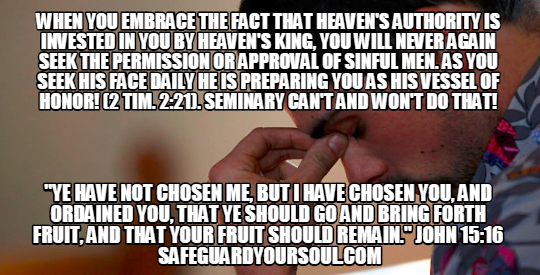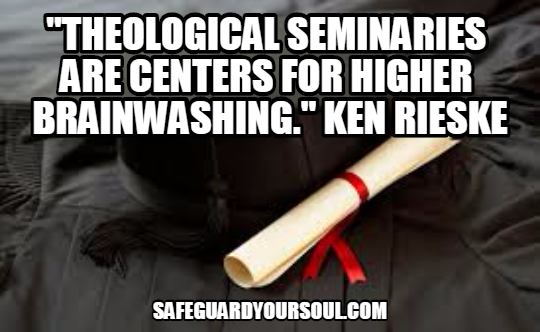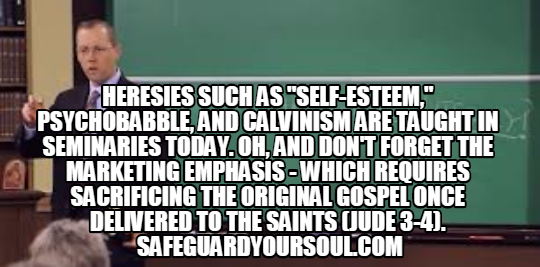From “Answers To Your Bible Version Questions” by David W. Daniels
Question: Gehenna is not hell, is it? It was a valley where outcasts, thieves and infected people where thrown when they died. The Bible refers to “Gehenna” as the place of death and pain. The word “hell”, as you so often use, where eternal pain and fire awaits is actually “Gehenna”. If you have read a bible written before 1400, you will notice a very important thing: “HELL” is missing. Instead it says “Gehenna”. There is no fire breathing eternal pain demon hell!! In fact YOU are committing a sin here. Telling people, or lying to people about hell, when you should know about “Gehenna”. There is no hell. Only the valley of “Gehenna”. A graveyard!!
Answer: The word “Gehenna” is properly translated “hell” in the King James Bible. And actually, except for three known Bibles1, every Bible says “hell,” not the untranslated word “Gehenna”.
What does “Gehenna” mean?
“Gehenna” originally referred to the Valley of Hinnom by Jerusalem. It was the place of horrible idolatry. So when the Hebrews finally came back to Jerusalem after 70 years of Babylonian Captivity (about 605-535/6 BC), they resolved never to use the Valley of Hinnom for idolatry again. Instead, they burned their trash there, and it became a burning valley of waste.
But we know that Jesus and the apostles didn’t mean to refer to a garbage dump. Here’s why. There are certain statements in the Bible that tell us clearly about “Gehenna”, translated “hell” in the King James Bible. Notice these verses.
Both body and soul are destroyed there
“And fear not them which kill the body, but are not able to kill the soul: but rather fear him which is able to destroy both soul and body in hell” (Matthew 10:28). No power on earth can destroy a soul. The soul is a part of a person that exists beyond physical death (Revelation 20:4). “Gehenna” has to be a place to destroy both the body and the soul.
A person goes there after death
“And I say unto you my friends, Be not afraid of them that kill the body, and after that have no more that they can do. But I will forewarn you whom ye shall fear: Fear him, which after he hath killed hath power to cast into hell; yea, I say unto you, Fear him” (Luke 12:4-5). It is no threat to throw a dead body into a grave, a junkyard or a furnace. But God has power to cast a person, whose body is dead, into “Gehenna.” There is only one reason to fear the person that can throw you into Gehenna: you must be aware that you are cast there. So Gehenna is hell, the place where the unrighteous dead are cast.
Its fire shall never be quenched
“And if thy hand offend thee, cut it off: it is better for thee to enter into life maimed, than having two hands to go into hell, into the fire that never shall be quenched:” (Mark 9:43, 45). “Gehenna” is said to be a “fire that shall never be quenched”. The earth and the works therein shall all be burned up (2 Peter 3:10), but they will be replaced with a new earth wherein righteousness dwells (2 Peter 3:13; Revelation 21:1). So “Gehenna” could not mean an earthly place, since all fires shall be quenched on earth. But hell’s fire shall never be quenched. It is clear: Gehenna is hell, not a trash dump.
Even though the word “Gehenna” comes from the Valley of Hinnom, simply rendering it as “garbage dump” or “valley of waste disposal” or “burning garbage” could not be an accurate translations, because that’s not what Jesus and the apostles meant when they used the word. It meant “the place where people go when they die.” That’s what we mean when we say “hell”.
You wrote:
“If you have read a bible written before 1400. You will notice a very important thing, HELL is missing. Instead it says Gehenna.”
You mentioned Bibles before 1400. The only known Bible in English from before then is the Wycliffe Bible of 1380. Does it use “hell” or “Gehenna”? Let’s find out!
The term “Gehenna” is found in Greek in these verses of the Bible:
Matthew 5:22,29-30; 10:28; 18:9; 23:15,33; Mark 9:43,45,47; Lu 12:5; Jas 3:6
Here they are in the Wycliffe version:
Matthew 5:22 But Y seie to you, that ech man that is wrooth to his brothir, schal be gilti to doom; and he that seith to his brother, Fy! schal be gilti to the counseil; but he that seith, Fool, schal be gilti to the fier of helle.
Matthew 5:29-30 That if thi riyt iye sclaundre thee, pulle hym out, and caste fro thee; for it spedith to thee, that oon of thi membris perische, than that al thi bodi go in to helle. And if thi riyt hond sclaundre thee, kitte hym aweye, and caste fro thee; for it spedith to thee that oon of thi membris perische, than that al thi bodi go in to helle.
Matthew 10:28 And nyle ye drede hem that sleen the bodi; for thei moun not sle the soule; but rather drede ye hym, that mai lese bothe soule and bodi in to helle.
Matthew 18:9 And if thin iye sclaundre thee, pulle it out, and caste awei fro thee. It is betere to thee with oon iye to entre in to lijf, thanne hauynge tweyn iyen to be sent in to the fier of helle.
Matthew 23:15 Wo to you, scribis and Farisees, ypocritis, that goon aboute the see and the loond, to make o prosilite; and whanne he is maad, ye maken hym a sone of helle, double more than ye ben.
Matthew 23:33 Ye eddris, and eddris briddis, hou schulen ye fle fro the doom of helle?
Mark 9:43 (9:42) And if thin hoond sclaundre thee, kitte it awey; it is betere to thee to entre feble in to lijf, than haue two hondis, and go in to helle, in to fier that neuer schal be quenchid,
Mark 9:45 (9:44) And if thi foote sclaundre thee, kitte it of; it is betere to thee to entre crokid in to euerlastynge lijf, than haue twei feet, and be sent in helle of fier, that neuer schal be quenchid,
Mark 9:47 (9:46) That if thin iye sclaundre thee, cast it out; it is betere to thee to entre gogil iyed in to the reume of God, than haue twey iyen, and be sent in to helle of fier, where the worme of hem dieth not,
Luke 12:5 But Y schal schewe to you, whom ye schulen drede; drede ye hym, that aftir he hath slayn, he hath power to sende in to helle. And so Y seie to you, drede ye hym.
James 3:6 And oure tunge is fier, the vniuersite of wickidnesse. The tunge is ordeyned in oure membris, which defoulith al the bodi; and it is enflawmed of helle, and enflawmeth the wheel of oure birthe.
So you see that “Gehenna” is not the term used in English at all! Not until Young’s Literal Translation in the late 1800s, followed by the Catholic New American Bible of 1970 was the untranslated “Gehenna” put in. Look at foreign translations. The Spanish Reina-Valera of 1602-1989 rightly says “el infierno” and the Portuguese Corrigida Fiel says “do inferno”, both of which mean “Hell” as we in English use the term. “Hell” is an understandable word. “Gehenna” is not.
And “hell” accurately translates the meaning of the word “Gehenna.” “Gehenna” is not a translation; it is just a transliteration (translating letters, but not meaning). We find that first in the perverted Roman Catholic Latin Vulgate (400s AD), which was forced on the people of Europe as the only legal Bible for over a thousand years. Not until the Reformation of the 1500s were God’s actual words translated into the language of the people. And every one of them was careful to translate “Gehenna” into an English word with the same meaning. All but two of the English Bibles, from at least 1380 onward (that’s all I’ve checked on this so far), translate “Gehenna” into the understandable word “hell.”2 That’s what a good Bible should do.
WHO NEEDS HELL?
“Hell” is an uncomfortable word. Everybody knows what it means. But new Bible versions, wherever possible, try to remove the word “hell” from the Scriptures and replace it with “sheol” or “gehenna” or “hades” or “Tartarus.” In doing so, they rob the Scriptures of the force of the word “hell.”
“Hades” has a big pagan meaning that is completely divorced from the Bible. “Sheol” is a Hebrew word without any meaning at all to an ordinary reader. Have you ever heard people say they don’t want to “go to gehenna?”
No. But people do say, “I don’t want to go to hell.” Many people’s salvation is based on that …they didn’t want to go to hell. They may not understand the love of God, but they understand clearly that they do not want to go to hell. The revival that happened under the ministry of Jonathan Edwards began with a sermon called “Sinners in the hands of an angry God.” His listeners felt themselves slipping out of their seats and their feet getting singed by the fires of hell when he preached, and revival broke out.
We need a Bible with a lot of hell in it. We need to know where we are not going. The whole purpose of evangelism is to save people from hell. We need a Bible that doesn’t try to sanitize it with a nicer sounding word that people don’t understand. That forceful warning word, “hell,” is found in the King James Bible.
I hope this has helped you understand the King James Bible a little more, and why it is the preserved words of God in English.
May God bless you as you read and understand His words.
Footnotes
- Specifically, the Roman Catholic Latin Vulgate (400s AD), Young’s Literal Translation (1862 & 1898) and the Roman Catholic New American Bible (1970-1991)
- This list includes the 1380 Wycliffe, the 1534 & 1535 Tyndale, the Cranmer (Great) Bible of 1539 & 1540, the Geneva Bibles of 1557, 1560 and 1599, the Bishop’s Bible of 1568 & 1602, even the Jesuit Rheims New Testament of 1582, and almost all Bibles from 1881 to the present. Except for Young’s Literal and the New American Bible, they all say “hell” (spelled “hel,” “helle” or “hell”), not “Gehenna”.
Is Hell Forever or Temporal? | More on Hell here
“Many shall be Purified, and made White, and Tried” Daniel 12:10 [podcast]
Apostasy
Biblical Case Against Seminary [podcast]

SATAN’S SEMINARIANS [podcast]
Satanic Seminarian System
People have to be first indoctrinated in order to go forth and indoctrinate others, their prey. This is the purpose of seminarians.
What could possibly sound more innocent than a man wanting to serve God going to seminary, right?
BEWARE OF THE SEMINARIANS WHO ARE THE SCRIBES AND PHARISEES OF OUR DAY! Satan loves to use that which sounds noble and spiritual and yet is not biblical. There are no seminaries in the New Testament! And it’s not biblical for a good reason. God’s Divine wisdom. To protect His body. Let’s stay with the Word saints!
SOME of the most pitiful deceivers I’ve ever conversed with have had a so-called “higher education.” In reality, there’s no such thing as a “higher education” outside of learning directly from the Most High Himself, out of the never-changing, crowning jewel literary work in His universe, the Holy Bible (2 Timothy 3:16-17).
HAVE you noticed the lightweight seminarians who peddle their half-truth false gospel, OSAS, calvinism, etc and how they market their community to build their church busine$$?
We should note that in general Christ warned us to “beware of men.” (Matthew 10:17) Jesus told us to beware of specific classes of sinful men. In doing so perhaps to some degree the Son of God was stereotyping. Here Jesus warns us to beware of the religious leaders (seminarians) and civil rulers and perhaps because they could do the most damage: “And he charged them, saying, Take heed, beware of the leaven of the Pharisees, and of the leaven of Herod.” (Mark 8:15)
The moment Jesus saved us, He inducted us into the school of the Holy Ghost and Word of God! THAT’S how God prepares His people for ministry! Seminary is a cheap substitute, waste of time and money (Psalms 119:105; Acts 1:8; 2 Timothy 2:15, etc.). Christ sends men to the cross and Pentecost (Holy Spirit baptism) and never to the seminaries of mere sinful men.
Who needs a seminary to learn God’s Word? – only a lazy man who refuses to lay down his life in this fleeting world and study to learn God’s Word intimately. Such a man is “not valiant for the truth” and so will be turned over to “strong delusion.” (Jeremiah 9:3; 2 Thessalonians 2:9-12)
“We have also a more sure word of prophecy; whereunto ye do well that ye take heed, as unto a light that shineth in a dark place, until the day dawn, and the day star arise in your hearts: 20 Knowing this first, that no prophecy of the scripture is of any private interpretation. 21 For the prophecy came not in old time by the will of man: but holy men of God spake as they were moved by the Holy Ghost.” 2 Peter 1:19-21
Personally, I waste no time on early church fathers or church history. They weren’t ordained, sanctioned by God exclusively to pen the words of Holy Writ, the Bible, which is God’s Word and the highest divine authority (2 Peter 1:19-21; 2 Timothy 2:15; 3:16-17). What’s it matter if you know what they said? The LORD didn’t ordain them to communicate His truth to the world. This does nothing but create confusion (1 Corinthians 14:33). Many would rather listen to what mere men had to say about God and the Bible than to search, study, and learn for themselves what God said in His own Word. The LORD has always instructed His people to study and learn and attend to HIS words (Deuteronomy 4, 6, 11, Isaiah 34:16, etc.).
“Study to shew thyself approved unto God, a workman that needeth not to be ashamed, rightly dividing the word of truth.” 2 Timothy 2:15
Seminarian Repentance
Attention seminarian or Bible College student, graduate: Not only does seminary not prepare you to be used of God, it gives you many things to unlearn and costs you much more than just a lot of wasted money. The ONE who saved you (if you are in fact saved) is the only ONE who can sanctify and prepare you to serve HIM. Seminary is at its root, apostasy, a departing from God to mere sinful men. If you claim to be born again and yet run to men to prepare you, there should be great concern (Galatians 1:16-17). PLAIN PROOF: Today’s apostate modern so-called “churches” become as they are – ichabod – by way of the jesuit-trained seminarian hirelings who drove them headlong into that apostasy. Seminiarian Apostasy Busted and Exposed!
ONLY JESUS can call, prepare and ordain a man to His work! All other “ordinations” and certifications are a fraud! John 15:16 !!!
There were no seminarians in the New Testament except those of the hell bound pharisees.
GOD is unchanging. Jesus sent no one to seminary. Jesus sends men to the cross then Pentecost! Otherwise a man is not fit for ministry. Seminary does not qualify a man for ministry. No, in fact, seminary puts a man light years behind, having many things he must now denounce and overcome and rid his life of. Repent and denounce all your “higher learning.” Until then, you are on your own, full of foolish pride and rebellion and the LORD will not use you (James 4:6-10). Paul denounced his “higher learning” trophies to know, be known of, and used by the LORD! (Philippians 3).
“Despite God’s word commanding men not to boast in their wisdom, and despite being told that “not many wise according to the flesh” are called, today’s evangelical landscape is replete with scribes and pharisees whose default question is, ‘By what authority do you do these things?’ They put their stock in how many credit hours they have obtained at such and such a seminary. Seminary credentials never qualified a man for God’s service, nor does a lack of “formal training” nullify what God approves. Indeed, God has chosen the foolish things of this world to confound the wise (1 Corinthians 1:27) When God calls anyone to a particular task, it matters not if others approve.” Servus Christi
DOES this not sum up what ministry is? Read closely: “For Ezra had prepared his heart to seek the law of the LORD, and to do it, and to teach in Israel statutes and judgments.” (Ezra 7:10)
We must go back further than the “reformation.” Nothing needed to be RE-formed…. because we have a Bible which is the final divine authority (Mark 13:31; 2 Timothy 3:15-17; 2 Peter 1:19-21, etc.). Many of the “reformers” were absolute heretics such as the demon possessed murderous maniac, John Calvin.
YOU see, in seminaries, their premise for teaching church history and about the reformers/reformation is so that their students will be able to discuss such when the topic comes up. But wait, you see THEY, the false priesthood of seminarians are the very ones who created that premise! Called out men must know God’s Word, not church history! SATAN is at work misdirecting men from simply learning God’s Word and walking in the power of the Holy Spirit. So, he’s diverted seminarians from simply learning Scripture using a curriculum that includes pagan prayer practices (contemplative prayer/spiritual formation), church history, and marketing. Jesus never did nor ever will send anyone to a seminary! The Son of God sends men who are truly in His will to the cross and to Pentecost!
Jim Borge writes: “As a young man, I was taught to believe that the Reformation was a great thing. As an older man I have grown to believe that the Church never needed reformation, it needed regeneration.”
IF you went to seminary or Bible college, perhaps the LORD would today lead you to repent of this work of the flesh, denounce it, and announce you utter dependence upon Him! Paul denounced all of his higher education to know and serve Christ (Philippians 3).
Sadly, most seminarians learn the lies of the protestant reformers instead of learning God’s pure Word!
The idea of “reformation” is just another lie and deception. Caution: Paul Washer is a calvinist … we don’t need “reformation” … never did! We need to simply get back to the “old paths” which is the Holy Scriptures! (Jeremiah 6:16) The LORD has given us “ALL things” in His Word! (2 Peter 1:3-4) The insidious, lying idea of a “reformation” is that something needs to be re-formed or formed again! But this is another lie from Satan because God’s Word has been perfect from the beginning and has “all” that we need! Beware. The “Protestant Reformation” was full of devils who believed and taught “reformed theology” and the diabolical system of “calvinism.” Run!
Bottom line: EVERYTHING we need God gave us in His Word and it doesn’t seminary to study and learn God’s Word!
Satan’s seminarians are his invention to put the church on ice!
Thinking of going to seminary? Before you do, read this post.
“What one generation tolerates, the next generation will embrace.” John Wesley
YOU show me a church “pastored” by one of Satan’s seminarians and I will show you a cold, dead, apostate sham!
Today the embrace, connection, and fornication between seminaries and the churches is an embracing of that which was tolerated in generations past and has brought epidemic apostasy in the local churches. The Methodist church is a prime example.
John Wesley was the founder of the Methodist church which is now a dead denomination and has been for a long time. Yet, Wesley was a firebrand for Christ who traveled over 150,000 miles by horseback to spread the Gospel of Jesus Christ. He preached over 40,000 messages from God’s Word in his lifetime!
It was only when the Methodist church began requiring it’s preachers to have a seminary degree that the fire of God extinguished (Ichabod) and the Holy Spirit was quenched. Today the Methodist church is dead men’s bones due to trusting in the flesh, degrees, etc., and not desiring and depending on the divine power of the Word and Holy Spirit.
SATAN HAD A PLAN TO ICE THE FIRE OF THE HOLY SPIRIT IN THE CHURCHES AND IT WORKED – AS FAR AS THE VISIBLE BUILDING-BASED CHURCHES GO.
Simple Scheme: If Satan can ice the seminarians, he ices the people they speak to.
The seminary church system has never nor ever will work to fulfill God’s stated will for His New Testament church. It’s a satanic fraud and counterfeit that has replaced the stated will of the LORD! “Antichrist” means simply “in place of.”
The Pharisees
The hell bound hypocritical pharisees were the seminarians of Christ’s day (Matthew 23).
EVERY catholic priest is seminary trained. What does that tell you?
Calvinistic wolves posing as pastors are seminarian graduates.
What does that tell you? Jude 3-4
Today they control nearly all building based churches.
But wait, don’t men who servant lead need to know the Word? Yes, but that in no way necessitates a “higher learning” center where mere men are in control and inevitably will contaminate.
MESSAGE RECEIVED:
“It does take a little training to rightly divide the Word. Of Truth.”
REPLY:
Yes it sure does …. no seminarian needed which without fail indoctrinates it’s students with extra-biblical heresies no different than the training received by the pharisees/false leaders/seminarians of Christ’s day (Mark 7:6-9).
ORGANIC, HOME BIBLE FELLOWSHIPS IS THE WAY THE EARLY CHURCH BEGAN AND SHOULD BE FUNCTIONING TODAY (ACTS 2:42-47).
Beware of the Seminary Salesmen!
Interestingly, when one searches the internet concerning the case for or against seminary training, he may just find this to be the only piece written from a biblical perspective and against seminary training. In perusing some of the many pro-seminary articles, one will search in vain to find much, if any Scripture. These pro-seminary sales pieces were apparently written by seminarians – using little or no Scripture. One thing is for certain: Jesus and His apostles never once instructed anyone to go to a higher learning facility.
TRULY REPENTING, surrendering your whole being, reputation, and will to Christ, getting baptized with the Holy Ghost, and organically studying God’s Word is the divine equipment for ministry, not seminary!
GOD NEVER CALLED ANYONE TO GET A SEMINARY DEGREE. IF SO JESUS WOULD HAVE TOLD HIS 12 TO GO TO A “HIGHER LEARNING” INSTITUTION. NO, JESUS CALLED HIS 12 AND IS CALLING US TO DIE – TO DENY SELF, TAKE UP THE CROSS, AND FOLLOW HIM! LET’S REPENT SAINTS, THAT’S WHERE IT ALL STARTS, BEGINNING WITH A DIVINE REFRESHING IN OUR SPIRITS! (ACTS 3:19)
Paul had more “higher learning” than 10 seminarians combined and he denounced it all as “dung” (crap) to know and to learn and to teach Christ! Study Philippians 3 afresh.
Jesus led Paul to denounce all of his higher learning – read Philippians 3 afresh with this in mind … he counted it dung … when I did this – denounced my formal education – the LORD delivered me and there was an increased anointing …. only Jesus can ordain us and anoint us to do HIS work – “Ye have not chosen me, but I have chosen you, and ordained you, that ye should go and bring forth fruit, and that your fruit should remain: that whatsoever ye shall ask of the Father in my name, he may give it you.” John 15:16
THE FRUIT OF THE MODERN CHURCHES IS CLEAR PROOF THAT SATAN IS AT THE ROOT OF THE SEMINARIANS WHO’VE DRIVEN THEM INTO APOSTASY!
Biblical Christian training does not involve organizations or institutions of sinful men – whose fruit reflects that of the sham false leaders of Christ’s day – who “love the praise of men more than the praise of God” (John 12:43) and set aside God’s Word to keep their own tradition (Mark 7:6-9). No institution of men needed for deep, thorough, organic, Spirit filled study of God’s Word. Jesus and His apostles never once instructed any person to go to a higher learning institution. In fact the seminarians of Christ’s day mocked the very Son of God specifically for not having a degree or the approval of sinful religious men (John 7:16-18).
To illustrate how indoctrinated seminarians become and why …. Have you ever noticed that when you see seminary students in coffee shops laboriously studying, you can spot them from a mile away – because they carry 3-10 commentary books of mere men around. That’s their curriculum instead of pure Scripture. Sometimes you can’t even find a Bible in the midst of their many books and when you do, it’s a lame, corrupted new per-version. SMH New Bible Versions and the Satanic Frauds who Invented them Busted and Exposed.
THERE’S A HUGE DIFFERENCE BETWEEN LEADING PEOPLE THROUGH SCRIPTURE AND INDOCTRINATING THEM IN EXTRA-BIBLICAL THEOLOGY SUCH AS THE DIABOLICAL SYSTEM OF CALVINISM/REFORMED THEOLOGY WHICH IS INTENTIONALLY DONE AT SEMINARIES.
One brother illustrates seminaries this way:
“Many colleges are just glorified roach motels…those who go in are infected and go back to infect the entire colony.” Nathan Noyes
JESUS told a seminarian of His day that he had to be “born again.” (John 3:3, 7) Obviously this man was not right with God. Nicodemus was a Pharisee and a member of the Sanhedrin mentioned in three places in the Gospel of John: He first visits Jesus one night to discuss Jesus’ teachings (John 3:1–21). Obviously Nicodemus was not a member of Christ’s family yet. This is clear, landmark proof that being religious and/or a leader in a religion or movement assures not that a person is truly a child of God. Hell is full of religious leaders, most of which are “false” according to Jesus (Matthew 7:15; 24:1,24; 1 John 4:1, etc.). The LORD never designed for His people to go to a school of “higher learning” but rather to receive the only Higher learning available – directly from the MOST HIGH Himself! Remember how the LORD told Ezekiel to simply eat His Word and then go speak those words? (Ezekiel 3)
The rebel at heart will do anything and everything except truly repent. He will mask his rebellion by spending several years and a small fortune to obtain a seminary degree, but like the hell bound false leaders of Jesus’ day, he will not repent.
“He answered and said unto them, Well hath Esaias prophesied of you hypocrites, as it is written, This people honoureth me with their lips, but their heart is far from me.” Mark 7:6
The profile of the seminarian is that he seeks the approval of sinful men and not God.
“And he said unto them, Ye are they which justify yourselves before men; but God knoweth your hearts: for that which is highly esteemed among men is abomination in the sight of God.” Luke 16:15
Sinful men always wants to insert themselves, legitimize and attempt to make prestigious their own personal certification and institutions where they reign and complicate the simplicity of divine truth and its instruction. Beware.
“Trust in the LORD with all thine heart; and lean not unto thine own understanding. 6 In all thy ways acknowledge him, and he shall direct thy paths. 7 Be not wise in thine own eyes: fear the LORD, and depart from evil.” Proverbs 3:5-7
Seminary will never make up for your refusal to authentically repent and get a real life with Christ! John 15:16
Personally, upon having attended 2 Bible colleges, I realized that many of the student, even those in their 4th year, were admittedly not born again. The fruit was obviousl
THERE was no such thing as a priesthood of professional clergy in Christ’s day or in the days of early church! (as far as HIS true kingdom is concerned) In fact, it wasn’t until the antichrist roman catholic cult formed that such a priesthood was instituted and has brought untold destruction since! In short, they’ve replaced the pure worship of Christ with everything under the sun! Jesus saw this coming and prophetically warned us about this when He said “Beware of false prophets, which come to you in sheep’s clothing, but inwardly they are ravening wolves.” (Matthew 7:15) Oh and “And many false prophets shall rise, and shall deceive many.”(Matthew 24:11) ….. Do you understand the import of Ezekiel 22:25-27? Here it is:
“There is a conspiracy of her prophets (false leaders) in the midst thereof, like a roaring lion ravening the prey; they have devoured souls; they have taken the treasure and precious things; they have made her many widows in the midst thereof. 26 Her priests (leaders) have violated my law (Word), and have profaned mine holy things: they have put no difference between the holy and profane, neither have they shewed difference between the unclean and the clean, and have hid their eyes from my sabbaths, and I am profaned among them. 27 Her princes in the midst thereof are like wolves ravening the prey, to shed blood, and to destroy souls, to get dishonest gain.” Ezekiel 22:25-27
The seminary system we see since the early New Testament centuries into the now is a clear manifestation and fulfillment of this prophecy given us by the LORD’s prophet Ezekiel. Exactly as Ezekiel warned, today there is a “conspiracy” among the fraternal order of seminarians who have a stronghold on the denominational franchises they run. Also as the prophet revealed “Her priests (leaders) have violated my law (Word).” (v26) The false prophet seminarians are man-fearing, man-pleasing hirelings who refuse to acknowledge, study, and preach the whole counsel of God’s Word (2 Timothy 4:1-4). Like the phony false priesthood of Christ’s day, they set aside the Word of God in order to keep the tradition and heresies they learned in seminary (Mark 7:6-9). In fact, this is a central biblical definition of false leaders and what they do – and we “know (discern) them by their fruit.” (Matthew 7:16, 20)
“He answered and said unto them, Well hath Esaias prophesied of you hypocrites, as it is written, This people honoureth me with their lips, but their heart is far from me. 7 Howbeit in vain do they worship me, teaching for doctrines the commandments of men. 8 For laying aside (rejecting) the commandment (Word) of God, ye hold the tradition of men, as the washing of pots and cups: and many other such like things ye do. 9 And he said unto them, Full well ye reject the commandment (Word) of God, that ye may keep your own tradition.” Mark 7:6-9
Satan’s Centralized System
We know from the revelation of Scripture that Satan has a well organized kingdom and uses his human agents and their systems to steal, to kill, and to destroy souls (Ezekiel 22:25-27; John 10:10; Ephesians 6:12).
Seminaries are a centralized organization of mere sinful men. SATAN is the centralizer! Think Babylon/Nimrod (Genesis 11). Think the upcoming centralized antichrist system (Revelation 13-14, 17-18). Yes, it’s God who has ordained that His assemblies of His people be autonomous and not controlled by a “headquarter” committee or centralized organization of modern pharisees who in most cases are indoctrinated into extra-biblical doctrines such as the cult of calvinism. Most pastors today are wolves who can’t even lead souls to Christ and deny the need for the baptism of the Holy Spirit (for starters). Satan always, without fail, perverts the men in control and then doles it out to those downstream (the churches). That’s why he centralizes and we are “not ignorant of his devices.” (2 Corinthians 2:11)
The Bible itself is the learning source for every saint. God’s Word is His centralized truth! (John 17:17; 2 timothy 3:16-17)
It’s real simple:
- Are you genuinely born again?
- Can you read?
- Do you have a King James Bible?
Case closed: You do not need to go to seminary. If you do, like the majority of seminarians, you may never return to the LORD to be used of Him and worse.
In the early church there were no professional clergymen as we see today in the apostate modern church world. This was Satan’s plan to denigrate and cease the power of the Holy Spirit which was poured out from Jesus on Pentecost and resulted in thousands being saved. Read Acts. At the hands of seminarian wolves, the modern church world is full of entertainment, marketing, and gimmicks and is plainly lukewarm and dead (Revelation 3:15-16). New Testament elders are not seen in the 27 book New Testament canon as those today who lord it over that which claims to be Christ’s flock. No, rather, elders in the early church were those who navigate and feed oversee (1 Peter 5:1-6). They were more like those who moderate the assemblies of God’s people in contrast with the seminary-trained, hi-jack artists we see in place today.
Seminaries are Wolf Factories! Beware!
“Many pastors have destroyed my vineyard, they have trodden my portion under foot, they have made my pleasant portion a desolate wilderness.” Jeremiah 12:10
Nancy Paul Cote writes: “Thanks again for your ministry’s articles. They so hit home and relate to my experiences of error. We were just talking about this in my new Berean Church yesterday. Both my husband and I can attest to this. Both of us were on fire for God and studied the word of God with our church ministries. We started out with an un-compromised Bible (KJB). Then, we listened to many say that to further our education with God we must go to a Bible College to get a degree to be more equipped for Ministry. Well, as we attended Bible College for 4 years I did not see our passion for biblical Truth growing—but declining. There were so many different views and different Bible Versions it only made me less prepared and more confused. We began relying on what the teachers said rather than what the Bible said because we were sure they know more because they had a degree, right? No, it was almost like I had to detoxify myself of all of man’s wisdom and get back into my KJB and fellowship with those with like-minded passion. I did just that in 2014. God has been so good to me. ‘Who is a wise man and endued with knowledge among you? let him shew out of a good conversation his works with meekness of wisdom. But if ye have bitter envying and strife in your hearts, glory not, and lie not against the truth. This wisdom descendeth not from above, but is earthly, sensual, devilish. For where envying and strife is, there is confusion and every evil work. But the wisdom that is from above is first pure, then peaceable, gentle, and easy to be entreated, full of mercy and good fruits, without partiality, and without hypocrisy. And the fruit of righteousness is sown in peace of them that make peace’ (James 3:13-18).”
False leaders have been the demise and damnation of millions. Hell is full of false leaders and those who chose to follow these wolves in sheep’s clothing instead of Christ.
“For the leaders of this people cause them to err; and they that are led of them are destroyed (in hell).” Isaiah 9:16
Jesus never told you to go to seminary. Rather, He commanded you to lay down your life right now and follow Him. Now read these words from Jesus and see if you need seminary to understand this simple truth:
“If any man will come after me, let him deny himself, and take up his cross daily, and follow me. 24 For whosoever will save his life shall lose it: but whosoever will lose his life for my sake, the same shall save it.” Luke 9:23-24
Professional clergymen have hi-jacked and ruined the life of Christ from that which feigns to be representing Him. Most of them came from Satan’s seminaries!
Seminarian wolves have hi-jacked the local churches and that’s why true followers of Jesus are gathering organically – without the contamination of professional clergy wolves. Individual believers and true ministers of Christ who are not part of their fraternal, Jesuit-trained order are intentionally shunned in the apostate churches and yet are fulfilling their call like Jesus and His apostles – without a building to contain them from reaching the people.
NEWS FLASH: SATAN CONTROLS THE SEMINARIES, CHURCH SYSTEMS, AND LOCAL CHURCHES.
If your thought and perspective of serving God is the vision of a so-called church building, you do not have a kingdom perspective and are in desperate need of repentance, deep Bible study, and praying that the LORD opens your eyes.
When you truly realize that the MOST HIGH, the very KING of kings saves and ordains you – and you truly fear Him and not men – that will be the only ordination you ever mention or acknowledge! (John 15:16) Those to truly know the LORD and obviously fear Him, do not seek the approval of mere sinful men, especially the “accursed” who preach another gospel (Galatians 1:10). | Pastors According to My Heart (Jeremiah 3:15)
THE TRUE DISCIPLE OF JESUS WILL NOT BE SELF-MADE OR SEMINARY-MADE BUT RATHER SAVIOR-MADE! SELAH! SUCH A MAN DILIGENTLY AND DAILY SEEKS THE FACE OF THE LORD IN A LIFE OF PRAYER AND BIBLE STUDY! LIKE THE ONE HE IS TRULY FOLLOWING, HE SEEKS NO APPROVAL OF MEN.
God never sends any man to seminary. They are self-sent. Jesus says to follow Him: He had no degree and was mocked by the hypocritical religious leaders of His day (John 7:15-18). God has not changed. Those who truly know and follow Christ entered into the school of the Holy Ghost and Word of God the day He saved them!!!
ANY LOCAL CHURCH THAT SEARCHES FOR OR WOULD EVEN TAKE AS AN ELDER A SEMINARIAN WHO HAD NOT REPENTED AND DENOUNCED HIS PHONY SEMINARY DEGREE IS AN APOSTATE CHURCH! JOHN 15:16
In the qualifications for an elder among Christ’s body, can you find the need to be degreed?
Biblical Qualifications for Overseers
“This is a true saying, If a man desire the office of a bishop, he desireth a good work.
2 A bishop then must be blameless, the husband of one wife, vigilant, sober, of good behaviour, given to hospitality, apt to teach;
3 Not given to wine, no striker, not greedy of filthy lucre; but patient, not a brawler, not covetous;
4 One that ruleth well his own house, having his children in subjection with all gravity;
5 (For if a man know not how to rule his own house, how shall he take care of the church of God?)
6 Not a novice, lest being lifted up with pride he fall into the condemnation of the devil.
7 Moreover he must have a good report of them which are without; lest he fall into reproach and the snare of the devil.” 1 Timothy 3:1-7
THERE IS NOT ONE MENTION OF A HIGHER LEARNING DEGREE IN THE BIBLICAL LIST OF QUALIFICATIONS FOR AN ELDER. SUCH HAS BEEN ADDED BY MEN AND DEVILS.
The Son of God Didn’t have a Degree!
“And the Jews marvelled, saying, How knoweth this man letters (Jesus had no degree from sinful men), having never learned? (no formal education)
16 Jesus answered them, and said, My doctrine is not mine, but his that sent me.
17 If any man will do his will, he shall know of the doctrine, whether it be of God, or whether I speak of myself.
18 He that speaketh of himself seeketh his own glory: but he that seeketh his glory that sent him, the same is true, and no unrighteousness is in him.” John 7:15-18
On this passage, William MacDonald, author of the Believer’s Bible Commentary, notes:
“7:15 Those who heard the Savior marveled. Doubtless it was His knowledge of the OT (Scriptures) that impressed them most. But also the breadth of His learning and His ability to teach attracted their attention. They knew that Jesus had never been to any of the great religious schools of that day, and they could not understand how He could have such an education as He did. The world still expresses amazement and often complains when it finds believers with no formal religious training who are able to preach and teach the Word of God.
7:16 Once again it is beautiful to see how the Lord refused to take any credit for Himself, but simply tried to glorified His Father. Jesus answered simply that His teaching was not His own, but that it came from the One who sent Him. Whatever the Lord Jesus spoke and whatever He taught were the things which were the things His Father told Him to speak and to teach. He did not act independently of the Father.
7:17 If the Jews really wanted to know whether His message was true or not, it would be easy for them to find out. If anyone really wills to do God’s will, then God will reveal to him whether the teachings of Christ are divine or whether the Lord was simply teaching what He Himself wanted to teach. There is a wonderful promise here for everyone earnestly seeking the truth. If a person is sincere, and truly wants to know what is the truth, God will reveal it to him. “Obedience is the organ of spiritual knowledge.’”
7:18 Anyone who speaks from himself, that is, according to his own will, seeks his own glory. But it was not so with the Lord Jesus. He sought the glory of the Father who sent Him. Because His motives were absolutely pure, His message was absolutely true. No unrighteousness was in Him.
Jesus was the only One of whom such words could be spoken. Every other teacher has had some selfishness mixed in his service. It should be the ambition of every servant of the Lord to glorify God rather than self.”
Cross-Less Curriculums of Seminaries
“Enemies of the cross of Christ.” Philippians 3:18-19
CHRIST’S KING-DOM IS ALLLL ABOUT KING JESUS!!! AND NOT SOME CHUMP WHO’S BUILDING A CHURCH BUSINESS BY ENTERTAINING SELF-SEEKING GOATS WITH MUSIC AND TONED DOWN CLICHE’S, CATCHY PHRASES AND NEUTERED, “SUCCESS” MESSAGES.
“I once heard a wise old pastor say, ‘The best way to strip a man of his Christianity is to send him to Seminary.’” Gina Martin
“I have learned more from born again evangelists who never went to seminary, than those who did. They preach from the heart, keep the message plain and easy to understand, and know their Bible inside out!! More sacrilege and blasphemy has come from seminaries than I can count here. The Holy Spirit will God us in all we do, if we let Him.” Donna Hawthorne Riegler
Jeff Scholz writes: “God’s anointing is in His word. Even someone who is newly born again that barely reads the Bible, when they pick it up, even for the first time, as soon as they start reading God is already speaking to that individual. The LORD can call and use anybody at any time, any one of His people.”
Saints, the seminaries and their seminarian agents have created a stronghold over many parts of that which claims to be Christendom, smothering and snuffing out the life of Christ. Beware. Pray for understanding and insight and spread the light of truth on this darkness that has blanketed the minds of so many. These are the Nicolaitan devils, the very agents of Satan himself and their false systems and doctrines Jesus says He hates (Revelation 2:6, 15). Nicolaitan Devils Busted and Exposed!
Satan uses seminaries and seminarians in pulpits to produce these false leaders and to intercept and distort that innocence of the new believer who is a new creature in Christ by way of being now born again (2 Corinthians 5:17-18).
In the vast majority of local churches today, little emphasis is placed on the divine priorities of essential biblical truth such as the divinity and holiness of the LORD, the necessity of the daily cross and prayer, etc.
SEMINARIANS ARE TAUGHT TO READ WHAT OTHER MEN SAY ABOUT THE BIBLE INSTEAD OF SIMPLY STUDYING THE BIBLE FOR THEMSELVES. THEY ARE COMMENTARY INTENSIVE INSTEAD OF SCRIPTURE INTENSIVE!
I’ve been to two Bible colleges and many of those who attended (the students) were not even born again! Many of them openly and laughingly admitted to such!
Having a seminary degree means that someone has been taught well to not personally study and assimilate the whole counsel of God’s Word in an honest manner but rather to manipulate Scripture to teach and defile others which such diabolical systems of theology as calvinism and un-conditional eternal security. Calvinism is the Devil’s System and all who teach it are his wolves! Beware.
True servants of the LORD must be called and prepared by the LORD, not mere men who falsely feign to be Christ’s representatives. | Divine Preparation for Ministry
“Taught of God” …. (1 Thessalonians 4:9)
“The Holy Ghost teacheth”! 1 Corinthians 2:13
Seminary prepares no one for ministry – Only Jesus can do that in the life of the called-out, obedient men who choose to do things HIS way and not man’s way! “for many be called, but few chosen.” (Matthew 20:16)
SAVE YOUR MONEY AND TIME – GO TO THE SAVIOR, NOT SEMINARY!
If Jesus created, found, saved, and called you, can He not prepare you? (John 15:16)
Where is your faith? Is it in men or God? (Hebrews 11:6)
Some would argue that the world is more civilized now than it was 2,000 years ago when Christ came. Nonsense. They therefore argue that seminaries are a product of our enlightened age. Nonsense.
In the first century, we know of certainty that there was much emphasis placed upon the prestigious institutions of higher religious learning. This is further established by the mocking mention of Jesus not having a degree in John 7:15, and Paul’s credentials – being taught at “the feet of Gamaliel” and “an Hebrew of the Hebrews; as touching the law, a Pharisee.” (Acts 22:3; Philippians 3:5) Obviously there were great centers for religious learning, namely Jewish, in the days of our LORD and His apostles. Yet not only do we have not a single instance of Jesus or His apostles sending anyone to a higher learning center, the graduates of those institutions were actually the greatest persecutors of Christ and His apostles. They were antichrists. Nothing has changed! We have the same scenario transpiring all around us today in the professing church world.
There is no hate here toward men but rather the devil who has deceived men, leading them away from God while claiming to be representing Christ …. this subversion is characteristic of “the spirit of antichrist.”
The very reason we don’t have more intense and diligent Bible learning in the church world is due to seminarian leadership. Meditate on this. Seminary is like the catholic cult – designed by the enemy to keep people out of God’s Word for themselves.
The way “the spirit of antichrist” works…. is while feigning to be representing Christ, it misrepresents Christ. Subversive, insidious deception perpetrated against Christ and His people (2 Thessalonians 2:1-12; 1 John 4:3).
ANYONE WHO CRASSLY DISMISSES THE FACT THAT JESUS NEVER SENT ANYONE TO SEMINARY IS ALREADY OPERATING ON HUMAN WISDOM AND NOT GOD’S WISDOM AND IS DESTINED FOR A WASTED LIFE OF WOLFERY!
Seminaries train men to please men, not God. They train men to operate in devil-inspired and man-controlled churches which are apostate, Ichabod!
The Almighty is not impressed with a seminary degree and in fact cannot use you until you repent and denounce it and announce your full and complete dependence upon Him!
Seminaries create a type of brotherhood or fraternal order which causes the sin of respect of persons (Romans 2:11). In this God-less connection, there is respecter of persons which is a clear and sinful violation of God’s Word (James 2:9).
When some Jews got saved, Jesus told them to continue in the Word and as they did they would know His truth and be made free. Christ had all the opportunity in His Universe to direct these new believers to go to some higher learning institution that had set itself up. No such mention from the Son of God! Here it is:
“Then said Jesus to those Jews which believed on him, If ye continue in my word, then are ye my disciples indeed; 32 And ye shall know the truth, and the truth shall make you free.” John 8:31-32
Heaven’s King here taught these new believers that His truth – knowing and obeying it – would make them His disciples and make them free. Jesus clearly infers here that they could and would definitely know His truth if they “continued in” His “Word.”
To be Holy Ghost filled is very important per Scripture and yet not enough. You must have both the power and revelation of the Holy Spirit and astute adherence to the “sound doctrine” of Holy Scripture (2 Timothy 2:15; 3:15-17, etc.).
NO, YOU DON’T NEED SEMINARY, YOU NEED THE SAVIOR! MORE OF JESUS IS THE ANSWER AND PREREQUISITE FOR MINISTRY.
“Now when they saw the boldness of Peter and John, and perceived that they were unlearned and ignorant men, they marvelled; and they took knowledge of them, that they had been with Jesus.” Acts 4:13
Seminaries are an open pit, drawing men who were never called of God in the first place and intercepting, indoctrinating and destroying men who are actually God-called, making them “twofold more the child of hell than yourselves.” (Matthew 23:15).
Many who sign up for seminary see what they view as an easy profession. All they have to do is get the degree and they can send out resumes. Seminaries are a breeding ground for self glory which is completely contradictory to the teachings of Jesus.
Saints, this pride we see coming from people who claim to be Christian leaders because they attended a seminary is proof of the truth that seminaries do not prepare people to serve God, period. Many are full of self and may God grant repentance. See John 7:18 – “He that speaketh of himself seeketh his own glory: but he that seeketh his glory that sent him, the same is true, and no unrighteousness is in him.”
“Higher learning” is in reality indoctrination, brainwashing.
Is the world getting smarter or dumber? Want to get humbled and embarrassed? Look up the 8th grade primer from just 100 years ago here in America. Most college graduates couldn’t answer near half of those questions. Shocking dumb down! In the same way, preachers of old knew God’s Word and had mountains of Scripture from the King James Bible committed to memory.
EXAMPLE OF THE PROPHESIED GREAT FALLING AWAY / APOSTASY (2 THESSALONIANS 2: NOT 1 SEMINARY TODAY USES THE KING JAMES BIBLE WHICH IS THE PRESERVED WORD OF GOD TO THE ENGLISH SPEAKING PEOPLE OF THE WORLD (PSALMS 12:6-7).
Prayer of Repentance: Father, I here and now acknowledge You and how You alone made, saved, and called me for Your purposes. In the name of Jesus Christ, right this moment, I confess my sin of pride and self-idolatry and for not seeking Your face in this matter. I now see how I went my own way and not Yours. Please forgive me now LORD and instill thy holy fear in my bosom, leading me in Your paths to know and be prepared to be used of You. In Jesus’ name, amen!
Seminaries Slammed!| Today’s False Church System
Pastors | Prepared to be Used | Satan’s Seminaries | Support | STORE | Podcasts | Eternal Security/OSAS | Accounted Worthy to Escape [podcast] | Eternal Security Exposed | Sealed? | The Return of Christ | Lie of the Ages [podcast] | 10 Questions about Eternal Security | Is Salvation Eternal? | The Damning Myth of Unconditional Eternal Security [podcast] | The Essential of Fearing God | The KING is Coming [podcast]


Abiding
The LORD Lift Up His Countenance Upon Thee, and Give Thee Peace [podcast]

“For we ourselves also were sometimes foolish, disobedient, deceived, serving divers lusts and pleasures, living in malice and envy, hateful, and hating one another. 4 But after that the kindness and love of God our Saviour toward man appeared, 5 Not by works of righteousness which we have done, but according to his mercy he saved us, by the washing of regeneration, and renewing of the Holy Ghost; 6 Which he shed on us abundantly through Jesus Christ our Saviour; 7 That being justified by his grace, we should be made heirs according to the hope of eternal life.” Titus 3:3-7
“The LORD bless thee, and keep thee: 25 The LORD make his face shine upon thee, and be gracious unto thee: 26 The LORD lift up his countenance upon thee, and give thee peace. ” Numbers 6:24-26
Support | STORE | Podcasts | The Return of Christ | Stewardship | Where to Give and Where Not to Give | Fruit Abounding to Your Account! | Victory in Jesus | Discipleship | The Glorious Grace of God | The Restoring Love of Our God | God’s Mercy | Spiritual Warfare | Justification | Grace and Good Works [podcast]


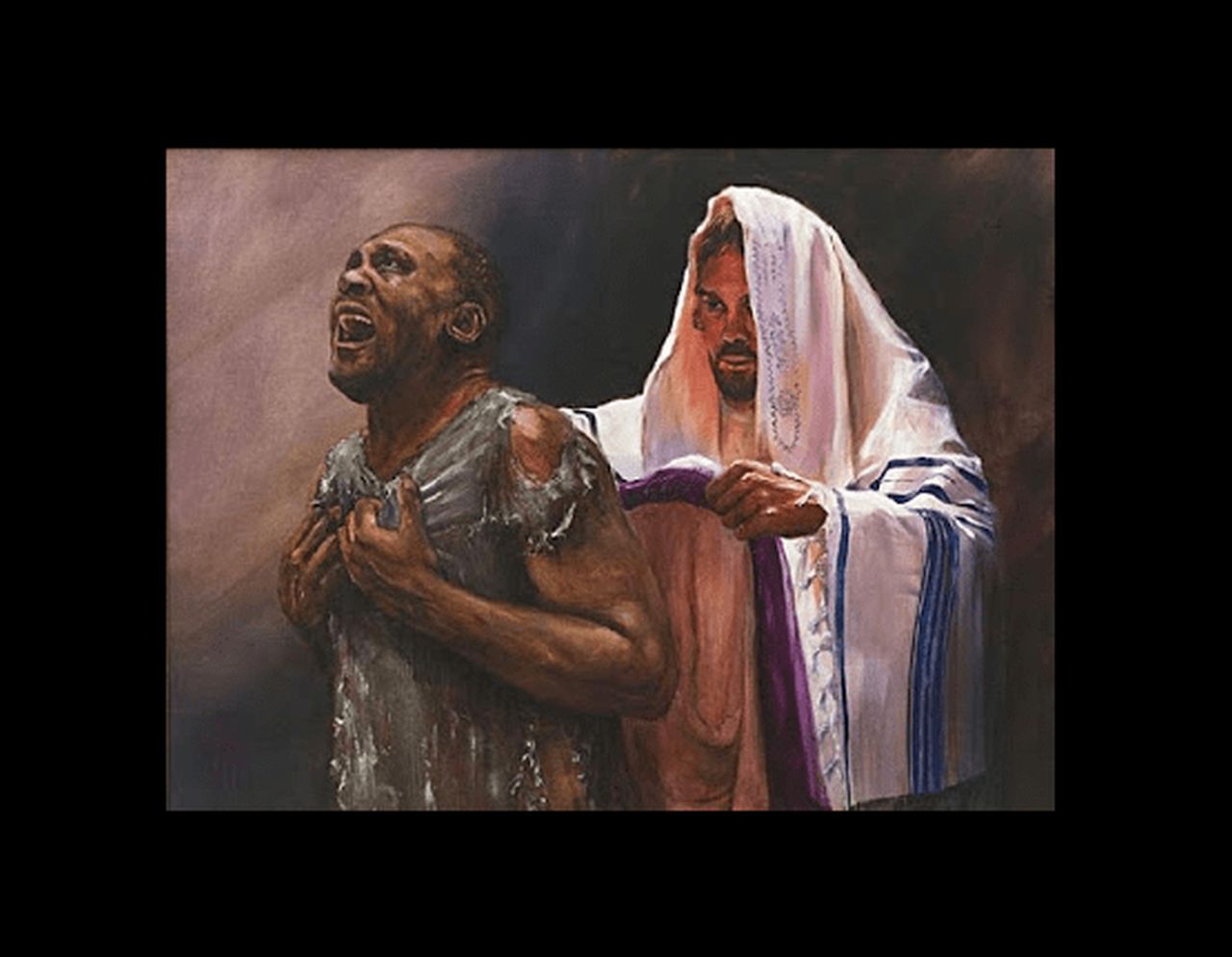

Abiding
Mexico Army Personnel Receive the Gospel [podcast]

“Excellent podcast! I am in awe of what God is doing in the hearts of the people of Mexico.” Karen Cochran
“But by the grace of God I am what I am: and his grace which was bestowed upon me was not in vain; but I laboured more abundantly than they all: yet not I, but the grace of God which was with me.” 1 Corinthians 15:10
“Therefore, my beloved brethren, be ye stedfast, unmoveable, always abounding in the work of the Lord, forasmuch as ye know that your labour is not in vain in the Lord.” 1 Corinthians 15:58
Let’s Grow Together! Sign up here to begin receiving the Moments with Our Master email devotional that is sure to help you grow in His grace and in the knowledge of our LORD and Savior Jesus Christ (2 Pet. 1:2; 3:18). It’s sent out for the edification of the body of Christ. Sign Up HERE.
Support | STORE | Podcasts | Jail/Prison Ministry | Mexico Mission here | All Ministry Updates | More on Assurance here | Because You Care Page | The Greatest of these is Charity | Be Ready in the Morning [podcast] | The Sure Mercies of David [podcast] | That Repentance and Remission of Sins should be Preached [podcast] | At His Feet | Knowing God | The Cross Life | 100’s of Christ-centered Scripture-rich Podcasts | Christology = the Study of Christ
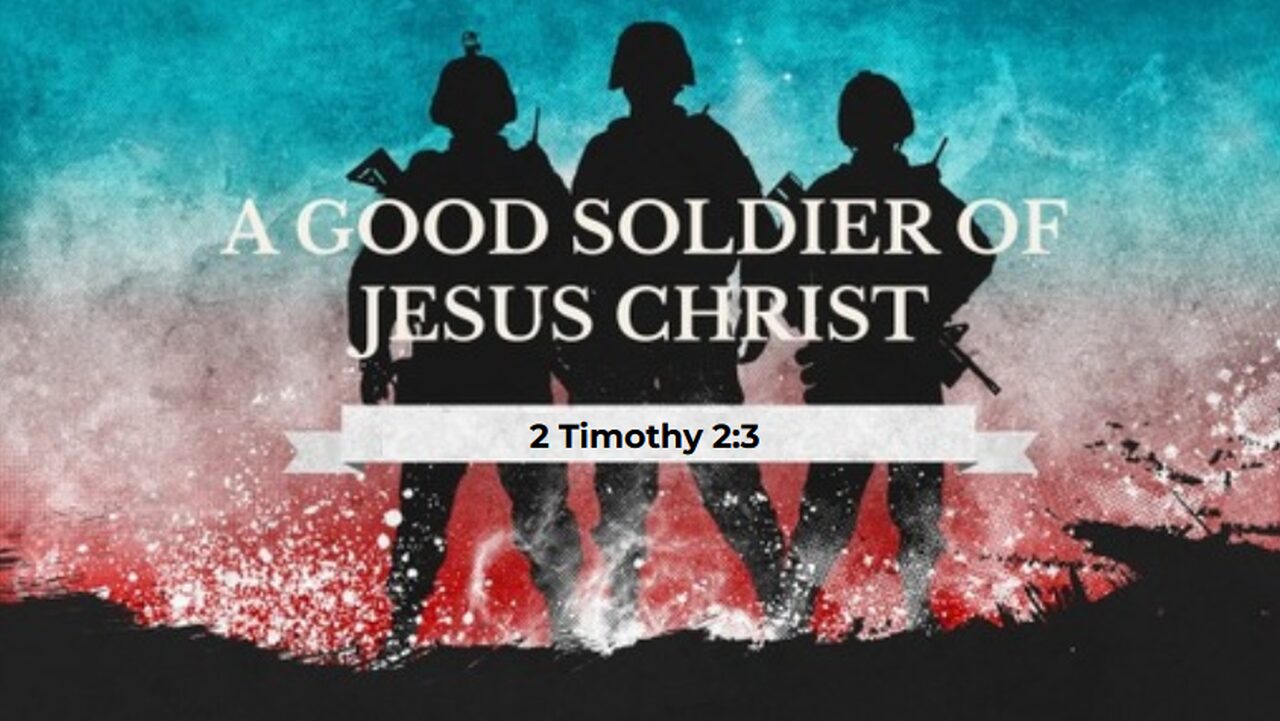


 America12 months ago
America12 months agoThe Drugging of America: The Pharmakeia Sorcery Deception [podcast]

 Articles2 years ago
Articles2 years agoChildren being Rescued in Tunnels: Happening Now – UPDATE!

 Articles8 years ago
Articles8 years agoSelf-Examination in Preparation for the Lord’s Return

 Apostasy2 years ago
Apostasy2 years agoSHOCKING List of False Prophets Most Believe are True












